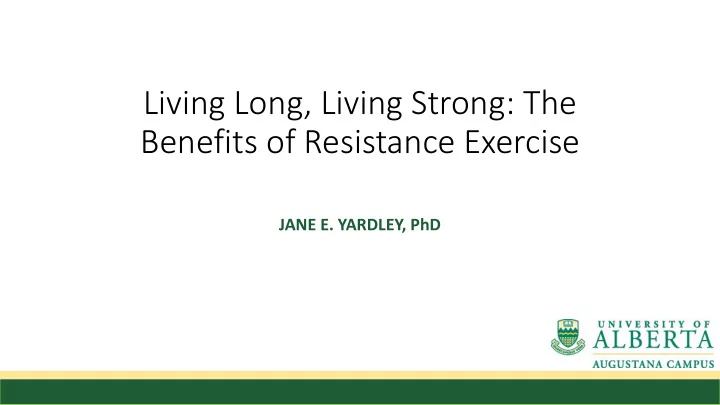

Living Long, Living Strong: The Benefits of Resistance Exercise JANE E. YARDLEY, PhD
Fueling the Body Food Carbohydrate, lipid (fat), protein ATP Muscle contraction
Where is the Energy Stored? • Lipids (fat) • Adipose tissue (97.53%) • Muscle (2.43%) • Blood (0.04%) www.linkpublishing.com • Carbohydrate (glucose) • Muscle (79.52%) • Liver (19.88%) • Blood (0.60%) http://themedicalbiochemistrypage.org/carbohydrates.html
What you burn depends on how hard you work Low/moderate intensity (Aerobic) • Fat Type of fuel • Glucose • Amino acids • Adipose tissue Storage area • Blood glucose • Muscle Key Hormones Insulin and glucagon www.primusweb.com
What you burn depends on how hard you work High Intensity (Anaerobic) • Glucose Type of fuel • Muscles and liver Storage area • Stored as glycogen Key hormones Epinephrine , norepinephrine
Key Differences • Insulin and glucagon no longer major players • EPINEPHRINE (a.k.a. adrenaline) is the boss
Fight or Flight Response • Prepares body for action (sympathetic nervous system) • Epinephrine and norepinephrine released • Blood pressure, breathing, and heart rate increase • Blood flow to muscle enhanced • Fuels (glucose and free fatty acids) released from storage into the blood • Metabolic rate/fuel usage increases
Resistance Training is Good for You! • Better body composition (more muscle, less fat) • Improves bone mineral density • Lowers risk of T2D • Decreases resting blood pressure • Improves lipid profiles • Improves cardiovascular health • Enhanced self-rated quality of life • Lower risk of hypoglycemia than aerobic exercise for people with T1D
Types of f Resistance Training at t the Novice/Intermediate Level* Main Goal of Weight Reps per Sets per No. of Velocity Rest Training (% 1RM) set exercise weekly between Program sessions sets More aerobic Build Muscular Light to 10 – 15 2 – 7 2 – 4 Moderate 1 minute Endurance moderate (or more) (50-70%) Increase muscle Moderate 8 – 12 1 – 3 2 – 4 Slow to 1 to 2 mass (60-80%) Moderate minutes Increase Moderate 6 – 12 1 – 3 2 – 4 Moderate 2 to 3 strength (60-80%) minutes Increase power Variable 3 – 6 1 – 3 2 – 4 Variable 3 to 5 More anaerobic and/or minutes explosiveness *Adapted from McArdle et al. Eds (2010) Exercise Physiology 7 th Edition
Aerobic vs. . Resistance Exercise in T1D a – significant change from baseline (aerobic) b – significant change from baseline (resistance) c – significant difference between aerobic & control d – significant change throughout recovery (aerobic) Yardley et al. Diabetes Care 2013; 36(3): 537-42
Time of f Day and Duration Turner et al. (2015) Scand J Med Sci Sports 24: e99-109
Resistance Exercise before Aerobic Exercise ● - resistance then aerobic exercise ○ - aerobic exercise alone * - significant change from baseline † - significant change throughout recovery Yardley et al. Can J Diabetes 2013; 37: 420-426.
Lancet Diabetes Endocrinol. 2017 May;5(5):377-390.
Anaerobic Exercise Diet Recommendations • Anaerobic exercise/high intensity interval training • Start between 5 and 7 mmol/L • CHO supplementation may be required for longer duration (>60 minutes) sessions • Meal with 45-65% CHO post-exercise to replenish glycogen • Low glycemic index bedtime snack
Anaerobic Exercise In Insulin Recommendations • Multiple daily injections • Nocturnal basal dose reduction of 20% post-exercise • Post-exercise bolus may be needed for hyperglycemia, but may also increase the risk of nocturnal hypoglycemia • Insulin pump • Reductions may not be required during exercise • Basal rate increase can be used to treat exercise-induced hyperglycemia • Nocturnal basal rate reduction of 20% post-exercise • Bolus insulin • No reductions recommended
Questions? je jeyardle@ualberta.c .ca
Recommend
More recommend